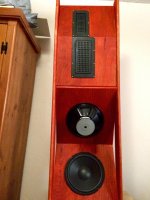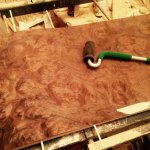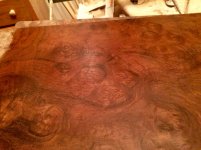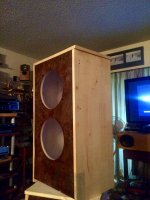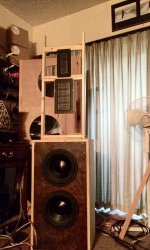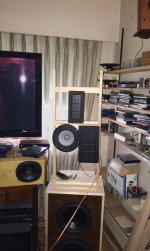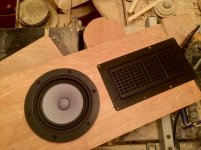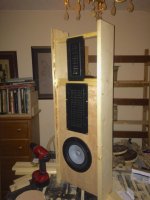Still fascinated with dipoles, Bohlender Graebener, and speaker building in general.
I've putzed around with several designs, and am now about ready for a more permanent solution.
I've also decided I don't really care for MDF, and chose engineered spruce panels for the bass section.
I've used an H Frame, as a tryout, and decided I'd rather do a U Frame.
Here's a shot of an earlier attempt at a planar mid tweeter array, with some inexpensive high Qts 10" woofers, liked it, but ultimately, the woofers were just not really accurate.
I've putzed around with several designs, and am now about ready for a more permanent solution.
I've also decided I don't really care for MDF, and chose engineered spruce panels for the bass section.
I've used an H Frame, as a tryout, and decided I'd rather do a U Frame.
Here's a shot of an earlier attempt at a planar mid tweeter array, with some inexpensive high Qts 10" woofers, liked it, but ultimately, the woofers were just not really accurate.
Attachments
A large part of the fun for me is increasing my rudimentary woodworking skills.
So I started with a flat baffle, and applied walnut burl veneer- my first attempt at veneering.
The already contact cemented veneer is separated from the panel with some small dowels, as contact cement mostly just sticks to contact cement.
This allows tweaking placement prior to final bonding.
So I started with a flat baffle, and applied walnut burl veneer- my first attempt at veneering.
The already contact cemented veneer is separated from the panel with some small dowels, as contact cement mostly just sticks to contact cement.
This allows tweaking placement prior to final bonding.
Attachments
Next up was a finish, nothing too drastic.
Real tung oil is hard to find, and a little expensive, so I adapted a Google recipe for a finish- beeswax,orange shellac, walnut oil, and a little Cabernet oil based tint.
I like oil finishes, and hope this will make the contact cement applied trim to be revocable, as long as they're assisted with mechanical fasteners.
Maybe the contact cement will be more like a sticky gasket; who knows.
Real tung oil is hard to find, and a little expensive, so I adapted a Google recipe for a finish- beeswax,orange shellac, walnut oil, and a little Cabernet oil based tint.
I like oil finishes, and hope this will make the contact cement applied trim to be revocable, as long as they're assisted with mechanical fasteners.
Maybe the contact cement will be more like a sticky gasket; who knows.
Attachments
Not finishing the 4 sided boxes until I hear them. I'm using 4 Dayton Audio RSS265HF-4 drivers, as I already owned two from a project a client welched on paying for.
I found these to be very good in vented enclosures as subs, and hope their middling Qts won't need a lot of eqing, also hoping stacking them will give a little boost in loudness at a given power level.
Going with an open frame to hold the Neo 10/Neo8 combo, hoping the woofers reach high enough for a good transition.
I found these to be very good in vented enclosures as subs, and hope their middling Qts won't need a lot of eqing, also hoping stacking them will give a little boost in loudness at a given power level.
Going with an open frame to hold the Neo 10/Neo8 combo, hoping the woofers reach high enough for a good transition.
Attachments
The bass is awesome, but the 200 hertz crossover point is uncomfortable for the Neo 10; pushing the woofers to 500 hertz is too high for what they're good at.
Enter the Markaudio Alpair 12p.
Shamelessly using Mr Linkwitz's idea of a three way active system, with the added bonus of a little passive sound shaping with a first order split midrange.
The output level and impedance at a @1500 hertz crossover frequency seem very close on paper, although I have no means of measuring it.
The all open baffle effort looks awful at this point, but sounds much better than expected.
Very smooth transitions through all crossover points, which is a relief, as once I ocd on a crossover point, it's all I can hear.
I kind of think dissimilar materials and design of drivers at high crossover points may have very different start, stop, and decay measurements, contributing to crossover points sticking out to me, even in very well regarded high end speakers.
In this case, the planars are quite similar in design and materials, so even crossed at 6500 hertz, they're pretty seamless.
The Markaudios are handling everything from 375 hertz to @ 1500, so voices are pretty much all in there.
I did notice some character changes, in the Neo 10's, but really they're so slight with either a Jantzen Superior cap, a Russian milspec polystyrene cap, or an Audyn Plus cap,as to be moot.
Bass to midbass transition is as good as I've heard, it sounds like real instruments, and voices, the only thing lacking is the unnatural crunch of box speakers.
Shamelessly using Mr Linkwitz's idea of a three way active system, with the added bonus of a little passive sound shaping with a first order split midrange.
The output level and impedance at a @1500 hertz crossover frequency seem very close on paper, although I have no means of measuring it.
The all open baffle effort looks awful at this point, but sounds much better than expected.
Very smooth transitions through all crossover points, which is a relief, as once I ocd on a crossover point, it's all I can hear.
I kind of think dissimilar materials and design of drivers at high crossover points may have very different start, stop, and decay measurements, contributing to crossover points sticking out to me, even in very well regarded high end speakers.
In this case, the planars are quite similar in design and materials, so even crossed at 6500 hertz, they're pretty seamless.
The Markaudios are handling everything from 375 hertz to @ 1500, so voices are pretty much all in there.
I did notice some character changes, in the Neo 10's, but really they're so slight with either a Jantzen Superior cap, a Russian milspec polystyrene cap, or an Audyn Plus cap,as to be moot.
Bass to midbass transition is as good as I've heard, it sounds like real instruments, and voices, the only thing lacking is the unnatural crunch of box speakers.
Attachments
I've got a pretty good idea of finishing the bass bins, but I'm stuck for the mid treble disarray.
Someone suggested channeling Vandersteen, and after a look, that sounds like good advice.
Any other suggestions?
Someone suggested channeling Vandersteen, and after a look, that sounds like good advice.
Any other suggestions?
you said neo10 could not handle 200hz
now you XO the mid at 375hz????
however, i agree that the lower XO point in this set up should be 200-250hz
and i don't like pushing planars that low (they distort very easily)
a suitable 8" should be able to do 200-250hz easy
i would like to think that your Seas 21tv should beat the Alpair
now the upper Xo point:
have you tried crossing the 8" under its dipole peak (1000-1250hz)
third point:
do you really need two planars?
i think Neo8 should be okay down to 1500-1250hz and perhaps 1000hz too
(Neo8S even lower)
now you XO the mid at 375hz????
however, i agree that the lower XO point in this set up should be 200-250hz
and i don't like pushing planars that low (they distort very easily)
a suitable 8" should be able to do 200-250hz easy
i would like to think that your Seas 21tv should beat the Alpair
now the upper Xo point:
have you tried crossing the 8" under its dipole peak (1000-1250hz)
third point:
do you really need two planars?
i think Neo8 should be okay down to 1500-1250hz and perhaps 1000hz too
(Neo8S even lower)
now my plans:
Neo8S on top
Seas 21TV-G or 21TV-GW in the middle
GPA 416-8B bottom
all swinging and nude (i might give the mid and top driver a soft baffle made of wool felt, same width as the 416-8B)
i might also add a separate 18" ripole or infinite baffle subwoofer
lower XO 200-250hz
higher XO 800-1000hz
subwoofer 50-60hz
i will also give the Neo8S a foam or felt treatment to help the vertical dispersion
http://www.diyaudio.com/forums/multi-way/232359-bg-neo8s-diy-pdred-used-tweeter-3.html
Neo8S on top
Seas 21TV-G or 21TV-GW in the middle
GPA 416-8B bottom
all swinging and nude (i might give the mid and top driver a soft baffle made of wool felt, same width as the 416-8B)
i might also add a separate 18" ripole or infinite baffle subwoofer
lower XO 200-250hz
higher XO 800-1000hz
subwoofer 50-60hz
i will also give the Neo8S a foam or felt treatment to help the vertical dispersion
http://www.diyaudio.com/forums/multi-way/232359-bg-neo8s-diy-pdred-used-tweeter-3.html
you said neo10 could not handle 200hz
now you XO the mid at 375hz????
however, i agree that the lower XO point in this set up should be 200-250hz
and i don't like pushing planars that low (they distort very easily)
a suitable 8" should be able to do 200-250hz easy
i would like to think that your Seas 21tv should beat the Alpair
now the upper Xo point:
have you tried crossing the 8" under its dipole peak (1000-1250hz)
third point:
do you really need two planars?
i think Neo8 should be okay down to 1500-1250hz and perhaps 1000hz too
(Neo8S even lower)
I'm referring to the mid tandem crossover point.
To be clear, the sub drivers go up to 375 hertz, the Markaudio goes to 1500 hertz, the Neo 10 goes to 6500 hertz, the tweeter finishes the top.
The 1500 hertz crossover point is the centre point, and the "knee" does start earlier, say around 1000 hertz, this sounds fine, but changes considerably with placement from the front wall.
I originally had a Neo 3PDRW, paired with the Neo 10's, but wound up liking the vertically controlled dispersion pattern of the 8's better.
I probably could get by with just the Markaudio , plus a BG Neo 3 or 8, but since I own the 10's, I'm pretty determined to use them.
I really like the TV21's- but I'm paranoid about blowing them, so they're a careful treat for vinyl record time.
The other reason for going with bass bins, plus a "head" unit- so I can swap the Seas/Peerless in or out easily, once I settle on a design for them.
I'm still thinking tilted, Stig Carlsson style, but dipole.
aesthetics?
a gown made of stretchy grill cloth is the way to go
I think you're right.
I'm just not sure she'd prefer it over my old t shirts she's appropriated.😉
aesthetics?
a gown made of stretchy grill cloth is the way to go
Okay, then, starting with a little baffle, will add side mast/wings, these to extend higher than the Neo 10/Alpair 12 pairing, to mount a no baffle Neo 8.
I'm planning to have the wings about 5 1/2" deep, with about 3/8" forward of the baffle, acting as a standoff for the covering.
I've ordered in some black stretchy grill cloth as you suggested, and will attempt to sew a tube "gown" to slip over the mast baffle assembly, probably capped like a Vandersteen, with some kind of wood and veneer, hopefully cherry to match the sides of the bass bins.
Attachments
And a cobbled together half H Frame, half no baffle rig, hoping this can reduce or eliminate eqing for the Markaudio , and lower the crossover point to the woofers.
Hopefully this doesn't reduce the sense of spaciousness I've come to enjoy from the baffleless mid treble rig too much.
Hopefully this doesn't reduce the sense of spaciousness I've come to enjoy from the baffleless mid treble rig too much.
Attachments
I would avoid the H/U frame for mid frequency
If you must, try acoustic foam wings instead of wood
And cover the wood baffle with thick felt
If you must, try acoustic foam wings instead of wood
And cover the wood baffle with thick felt
And a cobbled together half H Frame, half no baffle rig, hoping this can reduce or eliminate eqing for the Markaudio , and lower the crossover point to the woofers.
Hopefully this doesn't reduce the sense of spaciousness I've come to enjoy from the baffleless mid treble rig too much.
I performed a series of directivity measurements (distance 50cm, middle of driver) of the Neo10 to study the effect a baffle would have:
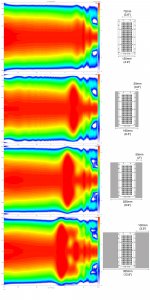
My goal was constant directivity so I decided to use the Neo10 without any baffle with a 24dB/oct LR HP at 400Hz and 24dB/oct LR LP at 2500Hz (see Totem of Tone for details).
Here's the comparison of the responses:
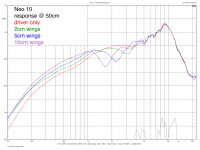
Hope this helps you find the compromise that works best for your system.
regards,
Gerrit
A tip for applying the veneer, try wax paper instead of dowels. Since someone showed me that I've never looked back. Much easier to work with and position your material.
David
David
A tip for applying the veneer, try wax paper instead of dowels. Since someone showed me that I've never looked back. Much easier to work with and position your material.
David
Thanks, this seems obvious in hindsight.
I'll try this soon.
- Home
- Loudspeakers
- Planars & Exotics
- Bohlender Graebener plus Markaudio
